
Sommaire
- 5 Top Tips for Improving Your Child’s Concentration
- Concentration in Children: A Developing Cognitive Process
- Understanding Why the Child Can’t Concentrate
- Creating Conditions Conducive to Sustainable Attention
- Who Should I Ask if the Issues Continue?
- School, Parents, Child: Working Together to Support Concentration
Your children’s capacity for concentration is key to academic success, as well as their overall well-being. Yet, staying attentive in a world full of stimulation can be difficult. At our bilingual school in the Paris region, we are aware of this challenge, which is why we offer individual support in close collaboration with families, helping each student improve their attention span incrementally and with ease.
5 Top Tips for Improving Your Child’s Concentration
If you have noticed signs of attention problems in your child, a few simple adjustments can make a big difference. Here are five specific strategies to help your child concentrate better. You can apply them starting with our bilingual nursery school in Paris, all the way through our bilingual middle school in Paris.
| Strategy | Description |
| Set consistent routines | A regular schedule helps the child feel secure and makes it easier to solicit their attention. |
| Create a structured environment | A calm and organised work space limits distractions and supports the child’s concentration. |
| Congratulate effort, not just results | Encouraging progress reinforces self-confidence, which is essential for attention. |
| Break up tasks | Breaking down tasks into small, clear steps prevents distraction and supports concentration over the long term. |
| Get them moving to better focus after | Moving breaks release pent-up energy and stimulate cognitive function. |
Concentration in Children: A Developing Cognitive Process
Understanding how attention and concentration works in children is essential to helping them learn. Before taking action, let’s identify exactly what concentration is and how it develops.
Defining Concentration: An Key Executive Function for Learning
Concentration means the ability to voluntarily focus attention on a task while suppressing distractions. It is one of the executive functions of the brain, which are necessary for learning at school. Despite what one may think, it is not automatic. Concentration must be built progressively as the child’s brain develops and requires a structured environment, specific pedagogy and a clear frame of reference.
How to Identify Concentration Issues in Children
Attention deficit manifests in different ways depending on the child’s age, but there is specific behaviour to watch out for: the child has a hard time finishing a task, is easily distracted, changes activities frequently, or seems “elsewhere” in class and at home. The child may also show signs of agitation, irritability or discouragement when effort is required. When these behaviours repeat in different situations, they require specific attention.
When Should I Worry?
It’s normal for a child to go through phases of distraction, particularly if they are tired or during transitions. However, if the concentration issues persist (longer than three to four weeks), affect their ability to learn, disturb daily life or create emotional difficulties, it is important to speak with the teaching team or a healthcare provider. Identifying the problem early is the best way to build a comforting and efficient support system.
Understanding Why the Child Can’t Concentrate
Before we can implement effective solutions, we need to understand what can disturb a child’s attention. There are many causes that are often interconnected.
ADHD: Attention Deficit Hyperactivity Disorder
ADHD is a common neurodevelopmental disorder that has a direct impact on the ability to regulate attention. It manifests as excessive impulsiveness, motor agitation, or its opposite, a constant state of day-dreaming. These children are not less intelligent, but have difficulty filtering stimuli and staying focused. A multidisciplinary evaluation is required for diagnosis, and support is provided through specific educational strategies, which may be accompanied by a treatment protocol.
Chronic Fatigue and Lack of Sleep
Insufficient or irregular sleep affects cognitive abilities, particularly attention and working memory. In children, this leads to reduced vigilance, irritability and difficulty in following the school schedule. Ensuring that the child has strict sleep hygiene (set bedtime and wake-up hours, no screens at night, a relaxing evening routine) is key for restoring the child’s attention span and improving cognitive availability.
Anxiety, Stress or Emotional Overwhelm
Unregulated emotions are major sources of distraction. A nervous, tense or emotionally overwhelmed child will have a hard time concentrating on a task. There can be various causes: academic pressure, family conflicts, hypersensitivity, life changes, etc. Identifying and receiving these emotions with care is the first step before applying educational strategies.
Lack of Motivation or Engagement
Concentration is closely tied to motivation. An understimulated child, one who doesn’t understand why they’re doing an activity, or who feels like a failure, will quickly get discouraged. Creating opportunities for success, giving value to the effort made and connecting learning to the child’s interests will help them get their love of learning back.
Difficulty in Understanding Directions
A child who does not understand what is expected of them cannot stay concentrated. This issue comes from a lack of clarity in directions, language related difficulties or a specific learning disability (such as dyslexia or dysphasia). Adapting the language used, restating the directions, and offering targeted support are ways of overcoming these issues and creating the basis for more stable attention.
Creating Conditions Conducive to Sustainable Attention
Once we’ve identified the causes, we support the child through targeted adjustments both at home and at school. These specific adjustments create a structured environment for the child, supporting their capacity for attention over the long term.
A Structured and Comforting Work Environment
Stability leads to attention. A specific work area that is quiet, well lit and free from visual or auditory distractions facilitates the child’s concentration. Their desk must also be organised, with only the equipment they need to complete the current task. Good lighting, an ergonomic chair and a quiet environment will reinforce the child’s ability to concentrate.
Regular, Comforting Routines
Children concentrate better when they know what to expect. Instilling daily routines, such as set homework times, bedtimes and meal times jumpstarts the child’s cognitive and emotional engagement. Consistency is key: it facilitates transitions between relaxation and concentration for children.
Break Up Tasks to Maintain Attention
A child can quickly get discouraged in the face of a long or complicated activity. Breaking up the work into short, clearly defined steps helps maintain their attention level without wearing them out. This break-down encourages the child’s progress and supports long-term engagement.
Moving Improves Concentration
Staying still for a long period of time is counter-productive, particularly for active children. Having them take regular movement breaks such as walking, jumping or breathing deeply will help them refocus better after. Some children also focus better on an activity when they learn standing, sitting on a ball or moving slightly.
Reading: A Ritual for Attention
Reading facilitates the child’s concentration while stimulating their imagination. As part of their daily routine, it helps the child get into a relaxed state conducive to learning. Reading alone, together or aloud is also a way to spend some relaxing time together, which helps the child recentre themselves and disconnect from digital distractions.
Congratulate Effort Instead of Results
In order to invest in a task, a child must feel that they are able to progress. Giving value to the effort made, even if it is minimal, helps build confidence and gives them a sense of accomplishment. This recognition also creates a positive feedback loop: the more the child feels valued, the harder they work, and the more their concentration improves.
Who Should I Ask if the Issues Continue?
Even with an appropriate setting and proper adjustments, some situations require professional help. Identifying when and who to contact prevents families from getting isolated and provides for the right support for the child.
When to Take Action
If your child’s concentration issues continue for longer than a few weeks, get worse or include emotional distress (frequent crying, refusing to go to school, loss of confidence), it is important to take action. If the child feels like a failure despite the effort they’ve made, it is essential to bring in professionals to prevent deeper disorders from developing.
Soliciting the Right Professionals
First, you can consult the child’s general practitioner, who will direct you to the right provider: a psychologist, neuropsychologist, speech pathologist, or psycho-motor therapist depending on the child’s needs. A diagnosis (of ADHD or other learning disabilities) requires a thorough evaluation and adapting education and treatment to the child’s needs.
Working with the School
Dialogue between families and the teaching team is important for detecting and treating attention disorders. At École Galilée, we work in close collaboration with parents and outside professionals to implement personalised educational adjustments that align with the pace and needs of each child.
School, Parents, Child: Working Together to Support Concentration
Facilitating concentration in children requires more than just individual strategies – it must be part of a shared approach. When the school, family and child work together in an environment based on trust, progress is better and lasts longer.
Structured and Compassionate Pedagogy
At École Galilée, we treat each child as an individual, with clear expectations, small class sizes and individual support. This allows us to closely observe the child’s needs and adapt our teaching practices accordingly: pace of work, attention span, specific instructions, targeted breaks, individual help, etc.
Regular Dialogue with Families
It is also important to work on concentration at home. This is why we make sure to maintain smooth and respectful communication with parents. Sharing observations, building adaptations together and sharing best practices are all part of our constant collaboration. This creates educational continuity to support the child’s progress and well-being.
Taking Responsibility for Their Own Progress
Finally, the child themselves must be fully involved. When they are supported through hard work and challenges, they get to know themselves better, identify what helps them concentrate and build independence. This active involvement will help them develop more stable attention and get their love for learning back.
Improving your child’s concentration helps them access a state conducive to learning and balanced development. At École Galilée, a school for gifted children in Paris, we believe in a holistic approach that is both individual and collaborative in order to help each child develop their full potential at their own pace.
Concentration, confidence and curiosity are the pillars on which we build sustainable success, together.

